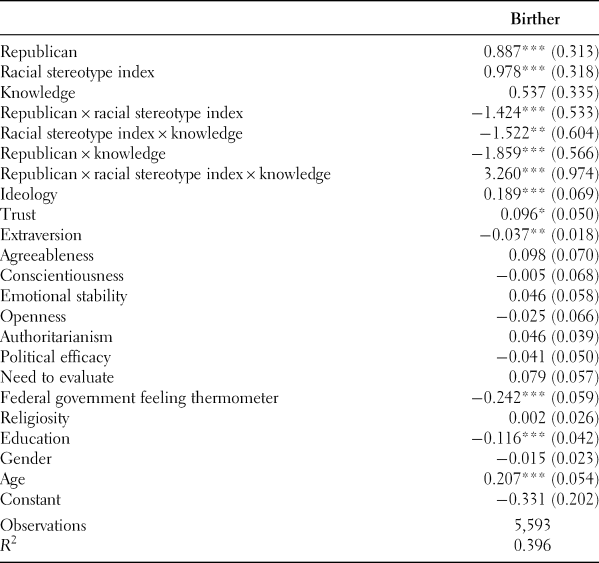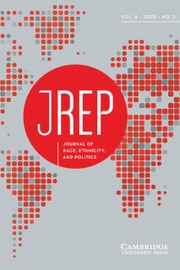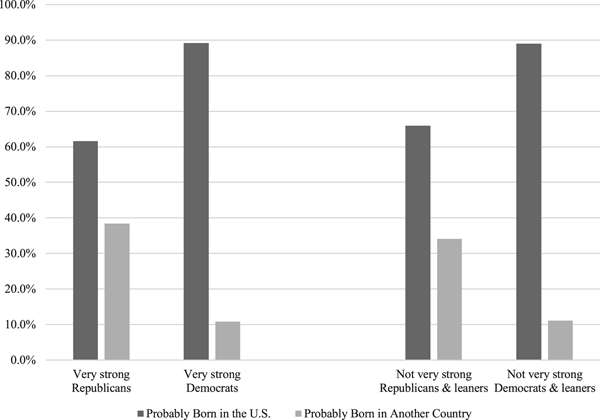Politics is rife with rumors, misinformation, and conspiracy theories. According to Oliver and Wood (Reference Oliver and Wood2014), over 50% of Americans endorse some sort of political conspiracy. Such beliefs are prevalent and persistent, even in the face of contradictory information (Nyhan and Reifler Reference Nyhan and Reifler2010). What is more, the proclivity to adopt incorrect beliefs cuts across demographic traits, political characteristics, and nationalities (Gentzkow and Shapiro Reference Gentzkow and Shapiro2004; Goertzel Reference Goertzel1994; Zonis and Joseph Reference Zonis and Joseph1994).
In short, conspiratorial beliefs are widespread. Furthermore, individuals often subscribe to multiple conspiracy theories (Krouwel et al. Reference Krouwel, Kutiyski, van Prooijen, Martinsson and Markstedt2017). Indeed, one of the best predictors of endorsing a particular conspiracy is an individual's belief in other conspiracies (Lewandowsky, Oberauer, and Gignac Reference Lewandowsky, Oberauer and Gignac2013; Swami et al. Reference Swami, Rebecca, Stefan, Jakob, Adrian, Sherry and Martin2011; Reference Swami, Jakob, Ulrich S., Ingo W., Stefan and Martin2013). It is perhaps for this reason that existing scholarship on conspiracies and political information has tended to focus on what underlies conspiratorial thinking, or the general propensity to subscribe to conspiracy theories. This work has identified a number of fundamental traits, predispositions, and contextual factors that are generally associated with the endorsement of conspiracy theories (e.g., Miller, Saunders, and Farhart Reference Miller, Saunders and Farhart2016; Oliver and Wood Reference Oliver and Wood2014; Swami Reference Swami2012).
Here, we argue that not all political rumors are sustained by the same underlying set of beliefs. Specifically, we focus on doubts about President Barack Obama's birthplace, also known as the birther rumor. We posit that conspiracies like the birther rumor are uniquely associated with attitudes toward the group of which the target of the rumor is a member. In particular, we show that the birther rumor is most likely to be adopted by white Americans who possess negative attitudes toward blacks. But we also suggest that like other conspiracy theories, the propensity to believe the birther rumor is a function of individuals’ motivations and abilities to protect these group attitudes and their partisan identities. Our findings, therefore, synergize extant work, some of which has found that the birther rumor is significantly linked with racial attitudes (Pasek et al. Reference Pasek, Stark, Krosnick and Tompson2014; Tesler and Sears Reference Tesler and Sears2010), with research on conspiratorial thinking more generally, which finds that incorrect beliefs are more strongly held among partisans and political sophisticates (Miller, Saunders, and Farhart Reference Miller, Saunders and Farhart2016). In short, we find, somewhat counterintuitively, that it is racially conservative and highly knowledgeable Republicans who are most skeptical of Obama's birthplace.
THE PATH AND PREVALENCE OF THE BIRTHER RUMOR
While false information and “fake news” may now feel like a normal facet of political discourse (Ramsay et al. Reference Ramsay, Kull, Lewis and Subias2010), President Barack Obama seemed especially vulnerable to widely circulating speculation about his background and history. During the period from 2004 to 2012, through his first term, there was extensive news coverage of Obama's religious preference, birthplace, and of the individuals questioning his Christianity and citizenship—efforts eventually known as the “birther movement.”Footnote 1 Despite investigative reports on his birthplace and the validity of his Hawaiian birth certificate, running commentary on talk radio and stories featured on conservative web sites and shared via email perpetuated these rumors.
Survey data provide strong evidence that the birther rumor rooted itself in the minds of a wide swath of the American public. Pollsters have measured public attitudes about Obama's citizenship ever since the controversies about his religion and eligibility arose. In a national survey conducted right after the 2008 election, Garrett (Reference Garrett2011) reports that 91% of Americans had heard or read about the rumor that Obama is a Muslim.Footnote 2 A much smaller majority (55%) had been exposed to countervailing information or to some suggestion that the rumor might be false. Of those surveyed, 22% believed that the rumor was true. Similarly, in the same survey, 59% had heard or read that Obama does not qualify as a natural-born citizen of the United States, and only 30% had heard some refutation of this rumor.
Like other political myths, the rumors about Obama's birthplace are persistent (Berinsky Reference Berinsky2017; Nyhan and Reifler Reference Nyhan and Reifler2010). Despite repeated efforts to correct the record by the news media and political elites, and even after the release of two different versions of his birth certificate three years apart and several investigative reports by news organizations about the circumstances of his birth, a significant portion of the American public still believes that Obama was not born in the United States, was raised a Muslim, and was therefore ineligible to serve as President. As recently as December 2017, 31% of U.S. adults believed it was possible Obama was born outside the United States.Footnote 3
THE ANATOMY OF A RUMOR
Despite the fact that conspiracy theories might seem farfetched, extreme, and incorrect, they are, as scholars have argued, much like other forms of public opinion. Thus, the propensity to endorse them is often associated with factors similar to those that explain other political attitudes and preferences. That is, rumor uptake is likely influenced by elite discourse, and an individuals’ decision to accept or reject a rumor is funneled through their pre-existing attitudes, beliefs, and identities. In short, uptake is a combination of political information and individual predispositions (Miller, Saunders, and Farhart Reference Miller, Saunders and Farhart2016; Oliver and Wood Reference Oliver and Wood2014; Uscinski and Parent Reference Uscinski and Parent2014; Zaller Reference Zaller1992).
Theories of rumor creation and dissemination therefore derive from research on the social psychological processes by which individuals evaluate and consider arguments that counter beliefs that they already hold and the conditions under which they reject or accept such arguments. These evaluations take place in the context of political events where elites attempt to construct persuasive messages to steer public opinion in their preferred direction (Edelman Reference Edelman1964). In this sense, misinformation is often intentional; it represents a concerted effort on the part of elites to persuade voters (Fetzer Reference Fetzer2004; Lewandowsky et al. Reference Lewandowsky, Ullrich K.H., Colleen M., Norbert and John2012). The media often tend to reinforce this strategic behavior, eschewing the presentation of general facts placed in context for vivid coverage of specific events and personal situations (Iyengar Reference Iyengar1991; Kuklinski et al. Reference Kuklinski, Paul J., Jennifer, David and Robert F.2000). Coupled with the proliferation of ideological content available on TV, radio, and the Internet, citizens are easily exposed to misinformation, and mere exposure and repetition is sufficient to fuel a rumor (Nyhan and Reifler Reference Nyhan and Reifler2010).Footnote 4
Scholars have also argued that individuals are inclined to endorse conspiracy theories because they fulfill several psychological purposes, including the need for certainty and control, particularly among those who are generally untrusting and who believe there are malevolent and nefarious forces at work in the world (Hofstadter Reference Hofstadter1965; Swami and Coles Reference Swami and Coles2010). Thus, some individuals—based on their personalities, identities, predispositions, or circumstances—may be more inclined to endorse conspiracy theories than others. Several studies have reported that conspiratorial thinking is associated with traits like authoritarianism and the need for cognitive closure, as well as with certain personality traits like agreeableness (Abalakina-paap, Stephan, and Gregory Reference Abalakina-paap, Stephan and Gregory1999; Goertzel Reference Goertzel1994; Miller, Saunders, and Farhart Reference Miller, Saunders and Farhart2016; Swami Reference Swami2012; Swami et al. Reference Swami, Rebecca, Stefan, Jakob, Adrian, Sherry and Martin2011).
Motivated Reasoning and Partisanship
Individuals might be motivated toward conspiratorial thinking by their personalities or circumstances, but most do not adopt such beliefs indiscriminately (Uscinski and Parent Reference Uscinski and Parent2014). When people are exposed to information, whether it is correct or not, they filter it through their existing belief systems (Berinsky Reference Berinsky2011; Lewandowsky et al. Reference Lewandowsky, Stritzke, Oberauer and Morales2005). Even when individuals are exposed to arguments on both sides of an issue, they internalize or accept claims that allow them to preserve their existing perspectives or prior conclusions about the political world, as well as those that are consistent with their group identities (Kahan Reference Kahan, Scott and Kosslyn2016; Lodge and Taber Reference Lodge and Taber2013). They are also more likely to accept information that accords with their existing beliefs and attitudes (Bolsen, Druckman, and Cook Reference Bolsen, Druckman and Lomax Cook2014; Kunda Reference Kunda1990; Taber and Lodge Reference Taber and Lodge2006). In other words, the decision to endorse a particular conspiracy is a form of motivated reasoning.
In keeping with this claim, previous work has found that individuals are more likely to take up conspiracies consistent with their political ideology or party identification (Berinsky Reference Berinsky2017; Miller, Saunders, and Farhart Reference Miller, Saunders and Farhart2016; Nisbet, Cooper, and Garrett Reference Nisbet, Cooper and Garrett2015; Nyhan Reference Nyhan2009; Oliver and Wood Reference Oliver and Wood2014; Pasek et al. Reference Pasek, Stark, Krosnick and Tompson2014; Uscinski and Parent Reference Uscinski and Parent2014). As a social identity, partisanship likely motivates individuals to want to protect their “team” (Green, Palmquist, and Schickler Reference Green, Palmquist and Schickler2002; Huddy, Mason, and Aarøe Reference Huddy, Mason and Aarøe2015). Thus, partisans ought to be driven to ascribe to political conspiracies that denigrate their partisan opponents and reject those that attack their co-partisans (Uscinski, Klofstad, and Atkinson Reference Uscinski, Klofstad and Atkinson2016).
In today's political and information environments—where both the public and political elites are more polarized than in the past—it is especially likely that political rumors take on a partisan and ideological cast. Whether in the realm of general attitudes about the role of government (Baldassarri and Gelman Reference Baldassarri and Gelman2008) or with regard to specific issues like climate change (Fisher, Waggle, and Leifeld Reference Fisher, Waggle and Leifeld2013), Americans’ attitudes are often defined and strengthened by their partisan identities (McCarty, Poole, and Rosenthal Reference McCarty, Poole and Rosenthal2006). Reports of partisan conflict itself, as transmitted through the media, can also contribute to polarization (McLaughlin Reference McLaughlin2018), as can social distance between partisans (Iyengar and Westwood Reference Iyengar and Westwood2014). As an attack on a Democratic president and the legitimacy of his position, the birther rumor is particularly partisan in nature, often perpetuated by Republican elites. We therefore expect to find, as others have, that Republicans are far more likely to endorse the rumor than Democrats (Nyhan Reference Nyhan2009; Tesler and Sears Reference Tesler and Sears2010).
Racial Othering
While partisanship may often be linked to the types of conspiracies to which certain individuals subscribe, we argue that the adoption of some political rumors is associated with another powerful force: group attitudes. A long line of work in political science has demonstrated that group attitudes powerfully shape public opinion, often above and beyond political ideology (e.g., Berelson, Lazarsfeld, and McPhee Reference Berelson, Lazarsfeld and McPhee1954; Campbell et al. Reference Campbell, Converse, Miller and Stokes1960). If the adoption of conspiracy theories, as many have argued, proceeds similarly to the formation of other political attitudes, we might expect that individuals are motivated to adopt and preserve beliefs consistent with their group attitudes, in addition to their partisan views. We may therefore find, in some instances, that group attitudes work in tandem with party identification in their association with conspiracy theories.
We focus here, in particular, on whites’ racial attitudes. For white Americans, racial attitudes are an especially potent component of contemporary public opinion, particularly on overtly racialized issues and certainly with respect to evaluations of non-white political candidates (Kinder and Sanders Reference Kinder and Sanders1996; Kinder and Winter Reference Kinder and Winter2001). Indeed, a number of studies have demonstrated that racial animus is significantly associated with whites’ negative attitudes toward Barack Obama, the nation's first African American president (Kinder and Dale-Riddle Reference Kinder and Dale-Riddle2012; Lewis-Beck, Tien, and Nadeau Reference Lewis-Beck, Tien and Nadeau2010; Piston Reference Piston2010; Tesler and Sears Reference Tesler and Sears2010).
We argue that racial attitudes also ought to be associated in a powerful way with rumors about Obama, and especially with birther beliefs. There are several important qualities to the birther rumor that are important to our argument. For one, it posits that Obama was born outside of the United States, and is therefore a foreigner. From this perspective, subscribing to the birther theory is an extension of a process of othering that begins with anti-black racial animosity. Second, the rumor effectively raises questions about Obama's eligibility and qualifications to be the president of the United States. Not surprisingly, several scholars have found that whites’ racial attitudes are strongly linked to doubts about Obama's birthplace (Hughey Reference Hughey2012; Pasek et al. Reference Pasek, Stark, Krosnick and Tompson2014; Tesler and Sears Reference Tesler and Sears2010). Thus, the birther rumor is not merely a partisan attack on Barack Obama as a Democratic president. It is also a racially charged rumor. For this reason, taking into account our expectations regarding partisanship, we expect that white Republicans with higher levels of anti-black animosity ought to be more inclined to adopt the birther rumor.
Motivated Reasoning and Political Sophistication
Past research suggests that political rumors are not, however, consistently adopted by those predisposed to believe misinformation for ideological or partisan reasons. One line of reasoning argues that less-knowledgeable individuals are more likely to believe political rumors, perhaps because they are less capable of assessing the validity of misinformation. But other work suggests that knowledge might have a very different effect. In fact, it appears, somewhat counterintuitively, that those with the highest levels of political knowledge are more likely to engage in biased processing (Bartels Reference Bartels2008; Lodge and Taber Reference Lodge and Taber2013; Miller, Saunders, and Farhart Reference Miller, Saunders and Farhart2016; Taber and Lodge Reference Taber and Lodge2006). Political sophisticates are both more capable of assessing the extent to which information aligns with their worldviews and more likely to possess strong political beliefs they are motivated to protect. Consistent with this logic, Miller, Saunders, and Farhart (Reference Miller, Saunders and Farhart2016) find that high-knowledge political ideologues are more likely to endorse ideologically consistent conspiracies.
Similarly, we argue that white Republicans with both high levels of racial animus and high levels of political knowledge ought to be skeptical that Obama was born in the United States. We do not anticipate, however, that racial attitudes are related to a subscription to other conspiracy theories that are ostensibly unrelated to race. For instance, we would not expect that racial attitudes are predictive of the belief that the Affordable Care Act (ACA) allowed for government-run “death panels” to make end-of-life care decisions – another popular conservative conspiracy theory circulating around 2012.Footnote 5
METHODS
We explore the portrait of a “birther” among white Americans using the 2012 American National Election Study (ANES). The ANES has several advantages. It was conducted, in person, among a national probability sample, and it included several questions assessing belief in contemporary conspiracy theories.Footnote 6 In our analysis, we examine only white attitudes (rather than all racial or ethnic groups) toward the birther rumor, with the expectation that their attitudes toward blacks are powerfully associated with skepticism about Obama's birthplace. We also examine only those whites interviewed face-to-face out of concern that different survey modes may yield substantively different results.
Measures
To measure belief in the birther rumor, respondents in the 2012 ANES were asked: “Was Barack Obama definitely born in the United States, probably born in the United States, probably born in another country, or definitely born in another country?” We compare the relationship between our variables of interest and the birther rumor to endorsement of a second conspiracy theory about “death panels.” The 2012 ANES included a measure of the extent to which respondents believed that the 2010 ACA authorized government panels to make end-of-life decisions for people on Medicare. We recoded both measures to range from 0 to 1, with higher values indicating subscription to the rumor. To facilitate interpretation of our results, all other variables in our models are recoded to range from 0 to 1 as well.
Our main explanatory variables are party identification, political knowledge, and racial attitudes. Our measure of party identification is the standard seven-point scale, and to facilitate interpretation of our interaction term, we transform this variable such that respondents who reported that they were “strong Democrats,” “not very strong Democrats,” and Democratic-leaning independents were coded as 0, and those who indicated they were “strong Republicans,” “not very strong Republicans,” and Republican-leaning independents were coded as 1. We also include a measure of political knowledge, comprised of a scale of the average number of correct responses to ten questions about politics (Zaller Reference Zaller1992).Footnote 7 We coded each individual item as 1 for correct or 0 for incorrect or skipped. The final scale ranges from 0 to 1.
To test our main claim, we also model endorsement of both conspiracies as a function of racial animus. Scholars of race rely on a number of measures to capture whites’ attitudes toward blacks, but we focus here in particular on racial resentment, defined as a combination of anti-black affect and the belief that blacks do not subscribe to traditional American values associated with the Protestant work ethic (Kinder and Sanders Reference Kinder and Sanders1996; Sears and Henry Reference Sears and Henry2005). Previous work has already demonstrated a direct association between racial resentment and birther beliefs (Pasek et al. Reference Pasek, Stark, Krosnick and Tompson2014; Tesler and Sears Reference Tesler and Sears2010). Because racial resentment embodies the belief that blacks are given special treatment or privileges they have not earned, we posit that this construct ought to be especially linked to birther beliefs, particularly since the birther rumor implies that Obama was unqualified for the presidency. We use the standard four-item measure of resentment, rescaled to range from 0 to 1. We also test the robustness of these relationships using standard stereotype measures of racial attitudes, and provide those results in Appendix C. Consistent with other examinations of conspiracy theories, we control for trust, political ideology, authoritarianism, the Big Five personality traits, need for cognition, external political efficacy, affect toward the federal government, religiosity, education, gender, and age.Footnote 8
RESULTS
We begin first with a simple analysis in which we compare the distribution of birther rumors by partisanship. In Figure 1, we can see there are sharp partisan distinctions in subscription to the birther rumor. While a majority of both Republicans and Democrats believe Obama was likely born in the United States, far more Democrats are certain of this than Republicans. Approximately 89% of very strong Democrats report that Obama was born in the United States, compared with 62% of very strong Republicans. Conversely, roughly 38% of very strong Republicans indicated on the survey that Obama was probably born in another country, compared with only approximately 11% of very strong Democrats. We can see from the chart that these trends are similar across different levels of strength of partisanship. Weakly identified and leaning Democrats are more confident Obama was born in the United States than are weakly identified and leaning Republicans.

Figure 1. Birther beliefs by party identification
Next, we consider which partisans are more likely to endorse the birther rumor. First, however, recall that we posited that racial animus ought to be associated with endorsement of the birther rumor, potentially independent of partisanship, as others have demonstrated. We would not expect, however, for racial attitudes to predict a propensity to believe other rumors, like the one about death panels. In the first two columns of Table 1, labeled as model 1, we examine birther and death panel beliefs as a function of party identification, racial resentment, political knowledge, and the controls described above.Footnote 9 We find, as anticipated, that racial resentment strongly and significantly predicts stronger skepticism about Obama's birthplace; and of course, partisanship is also significantly linked to the birther rumor, even after taking other factors into account. When model 1 is applied to death panels, however, we see that neither racial attitudes nor partisanship are associated with belief in this conspiracy. Both rumors, however, are associated with political knowledge. All else equal, more knowledgeable individuals appear less likely to subscribe to either rumor.
Table 1. The effect of racial attitudes, partisanship, and knowledge on endorsement of two conspiracy theories

Note: Table entries are unstandardized regression coefficients. Standard errors are in parentheses. Models include only non-Hispanic whites. Higher values of dependent variable indicate endorsement of rumor. Models control for ideology, trust, Big Five personality traits, authoritarianism, need to evaluate, affect toward the federal government, religiosity, education, gender, and age.
Source: 2012 ANES Time Series (face-to-face). Data are weighted.
***p < 0.01, **p < 0.05, *p < 0.1.
What happens, however, when we examine the effect of racial attitudes, conditional on partisanship? Are white Democrats and Republicans equally pushed by their racial attitudes to adopt the birther rumor? In model 2, we interact partisanship and racial resentment. Looking first at the effect of partisanship among those low on racial resentment, we see a positive but insignificant effect. In other words, strong Republicans at the lowest level of racial resentment are not significantly more likely to believe either the birther rumor or the death panel rumor. What is more, the results suggest that Democrats with higher levels of racial resentment are also not significantly inclined to adopt either rumor. We do, however, observe an effect on our interaction term, although we note the effect in this model achieves only marginal significance. Strong Republicans with higher levels of racial animus are more inclined to believe the birther rumor, but not the death panel rumor.
In model 3, we regress both the birther and the death panel rumors on a fuller model that includes the three-way interaction of partisanship, racial resentment, and political knowledge. We find, first, that the coefficient on party identification is large, positive, and statistically significant for the birther rumor. However, it has no significant relationship with respect to the death panel rumor. It also appears that partisanship and knowledge matter independent of racial animus. Republicans both low on resentment and low on knowledge are also more inclined to doubt Obama's birthplace. Thus, we find some confirmation that partisanship might drive individuals toward the birther rumor even when knowledge is low.
In the next row, we see the effect of racial resentment on rumor subscription among Democrats low on knowledge. Here, too, the effect is significant. Democrats low on knowledge and high on resentment are more likely to adopt birther beliefs. Again, we observe no such relationship, however, with respect to the death panel rumor. Thus, there is some evidence that racial resentment might compel members of the Democratic party to adopt the birther rumor, at least when knowledge is low.
Nevertheless, our main relationship of interest revolves around the interaction of partisanship, racial animus, and knowledge. We find, as expected, that the relationship is powerful, positive, and statistically significant. Republicans high on knowledge and racial resentment are significantly more inclined to adopt the birther rumor. We observe no significant effect, however, when it comes to the death panel rumor.
To illustrate our findings more distinctly, we graph in Figure 2 the shape of the interactions for belief in the birther rumor, comparing Democrats and Republicans, low and high on knowledge, across levels of racial resentment.Footnote 10 In the left panel of the figure, we largely see convergence. Democrats who are high on resentment and low on knowledge are more inclined to believe the birther rumor. At the highest level of resentment, the effect on rumor adoption between Republicans and Democrats low on knowledge is quite similar.
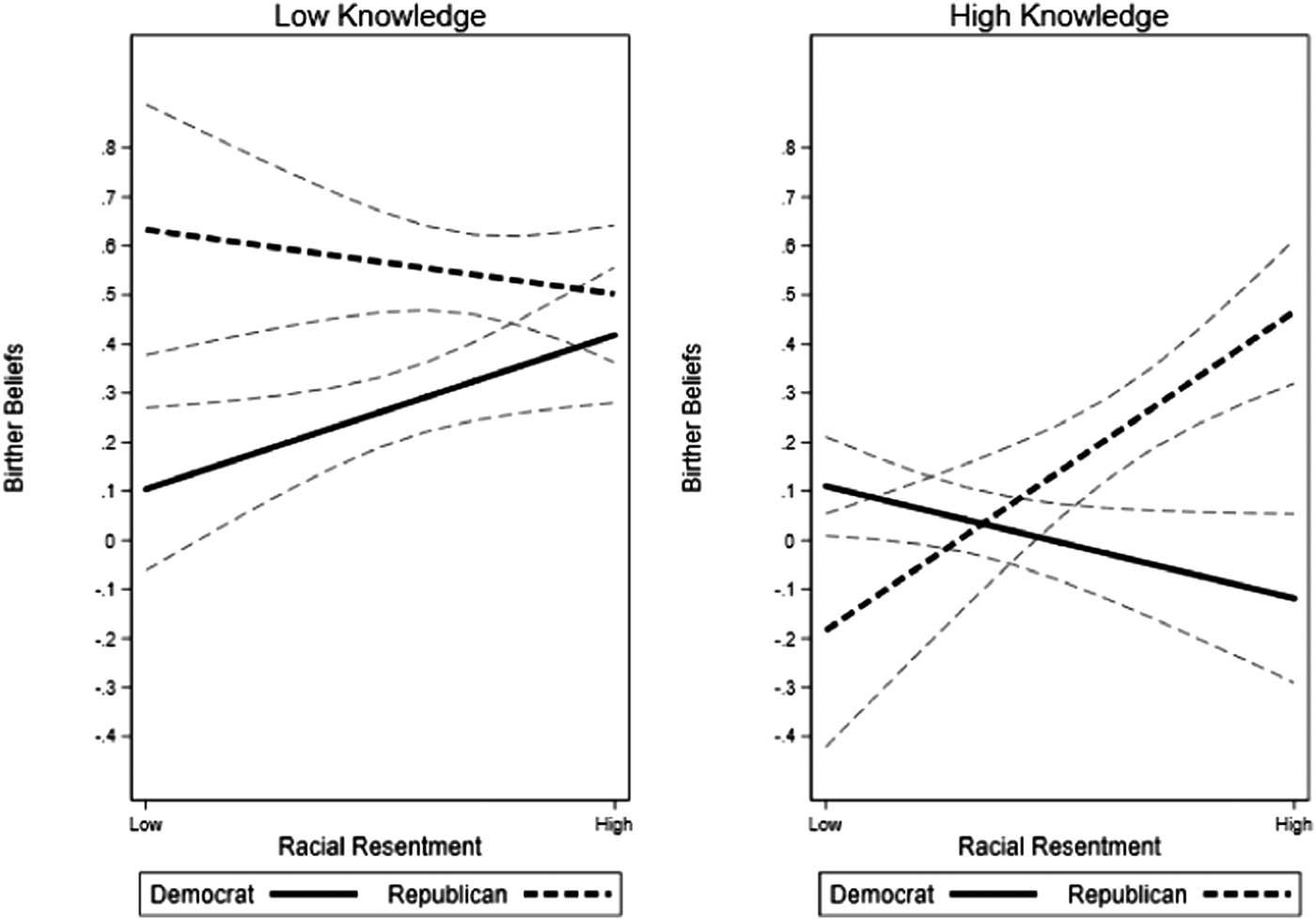
Figure 2. The effect of racial resentment on endorsement of birther rumor for Democrats and Republicans by high and low knowledge
A more interesting story, however, appears among those higher on knowledge. In the right panel, we see, as we expected, that at the highest level of knowledge, racially resentful Republicans are more likely to subscribe to the birther rumor, compared with those low on resentment. In fact, high knowledge Republicans who are low on the resentment scale are pulled in the opposite direction; they are more likely to believe Obama was born in the United States. But at the middle to high-end of the resentment scale, the effect is positive and significant. For Democrats, however, knowledge works differently; higher knowledge Democrats are much less disposed to endorse the rumor, despite their levels of racial resentment.Footnote 11 In short, and consistent with a motivated reasoning perspective, it is Republicans who are racially resentful and more politically sophisticated who are more likely to endorse the birther rumor—a conspiracy theory that is both partisan and intended to racially other its target, Barack Obama.
DISCUSSION
The results presented here replicate and synthesize prior research on conspiratorial thinking generally with results from studies of support for the birther rumor about Barack Obama in particular. Much of the previous research examining the psychological underpinnings of conspiracy theories does not consider the potential role of group attitudes. Here, we focused solely on whites, with the expectation that because of the birther rumor's racialized nature, whites’ attitudes toward blacks would be of special importance. Indeed, we find, as have others, that racial animus is significantly associated with whites’ propensity to adopt the birther rumor. Such attitudes are not, however, brought to bear on a non-racialized conspiracy theory like the death panel rumor.
We also add an important nuance to our claim about the importance of group attitudes in conspiratorial thinking by investigating the relative effect of political knowledge and partisanship. We argue, consistent with prior work on motivated reasoning, that individuals ought to be predisposed to accept political information that is consistent with not only their pre-existing partisan beliefs, but also with their group attitudes. What is more, we suggested that it ought to be those who are more politically sophisticated who are most motivated and capable of processing conspiratorial information in this way. Thus, the partisan aspects of the birther rumor, coupled with its racialized nature, meant that we anticipated that a particular set of political sophisticates ought to have been most likely to endorse this conspiracy theory. Indeed, we find that it is racially resentful Republicans with higher levels of political knowledge who are most likely to adopt the rumor.
Our work, however, does not merely re-emphasize the importance of group attitudes when it comes to conspiratorial thinking. It also raises an important point about treating conspiratorial thinking similarly to the way we think about other types of public opinion, as scholars argue we should. If we are to do so, we must not only take group attitudes into account, but we must also consider the possibility that different groups might accept or reject certain conspiracy theories at different rates depending on their in-group identities and out-group attitudes. Thus, just like other forms of public opinion, we might not expect all racial groups to take up rumors at the same rate or for the same reasons. As a result, moving forward, scholars and pollsters should consider examining subscription to some conspiracy theories separately by subgroup populations, particularly when such rumors implicate group identities or group hostilities. We note that this is a challenging task. Research in this area may currently be limited by a number of factors, which often do not co-occur in a single data collection: the relatively small sample sizes of non-white population groups in most national surveys, the lack of measures of affect toward “other” groups, and belief in specific rumors or conspiracy theories that might have a specific relevance for that group and not others. Nevertheless, when it comes to the endorsement of conspiracy theories and political rumors, our results here speak to the potential importance of taking group attitudes and identities into account.
ACKNOWLEDGMENTS
The authors would like to thank Vincent Hutchings, Josh Pasek, and Spencer Piston for their helpful feedback on the manuscript.
APPENDIX A
ANES Variable Names
For the question wording corresponding to the variables described here, see the 2012 ANES user guide at http://electionstudies.org/studypages/anes_timeseries_2012/anes_timeseries_2012_userguidecodebook.pdf.
Birther: nonmain_born
Death panel: nonmain_endlife
Racial resentment: resent_workway, resent_slavery, resent_deserve, resent_try
Partisanship: pid_x
Ideology: libcpre_self & libcpre_choose
Political knowledge: preknow_medicare, preknow_leastsp, pre-know_prestimes, preknow_senterm, ofcrec_speaker_correct, ofcrec_vp_correct, ofcrec_pmuk_correct, ofcrec_cj_correct, knowl_housemaj, knowl_senmaj
General trust: trust_social, trustgov_trustgrev, trustgov_trustgstd
Note: these items were part of a question working experiment. Therefore, in keeping with Miller, Saunders, and Farhart (Reference Miller, Saunders and Farhart2016), we standardized the measures before scaling them together into a scale with a mean of 0.
External efficacy: effic_carerev; effic_carestd
Affect toward federal government: ftgr_fedgov
Big Five Personality traits: tipi_extra, tipi_crit, tipi_dep, tipi_anx, tipi_open, tipi_resv, tipi_warm, tipi_disorg, tipi_calm, tipi_conv
Authoritarianism: auth_ind, auth_cur, auth_obed, auth_consid
Need to evaluate: cog_opin_x
Education: dem_edugroup_x
Religiosity: relig_import
Sex: gender_respondent_x
Age: dem_age_r_x
Appendix B
Effect of Racial Attitudes, Partisanship, and Knowledge on Endorsement of Two Conspiracy Theories
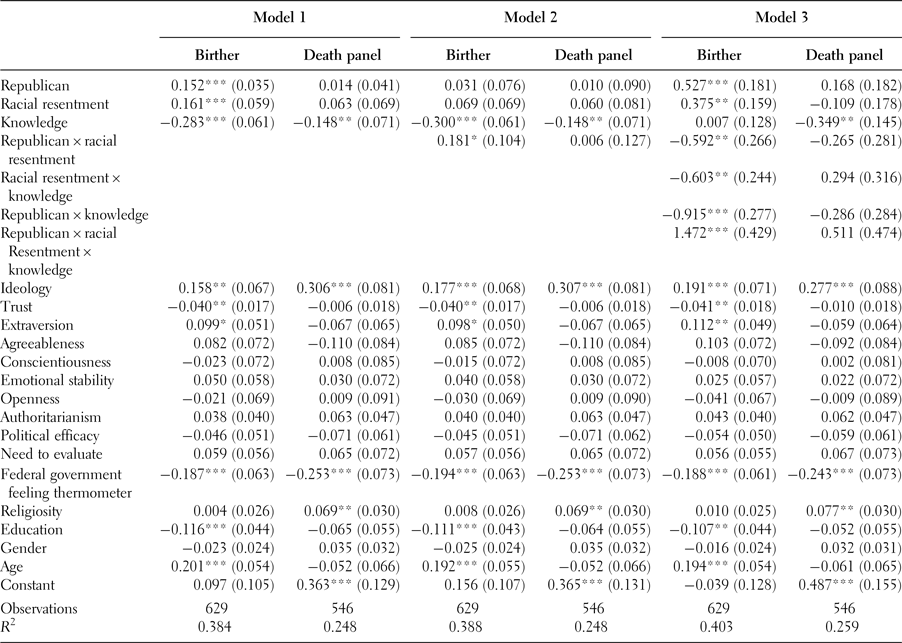
APPENDIX C
Effect of Racial Attitudes (Stereotype Measure), Partisanship, and Knowledge on Endorsement of Two Conspiracy Theories
